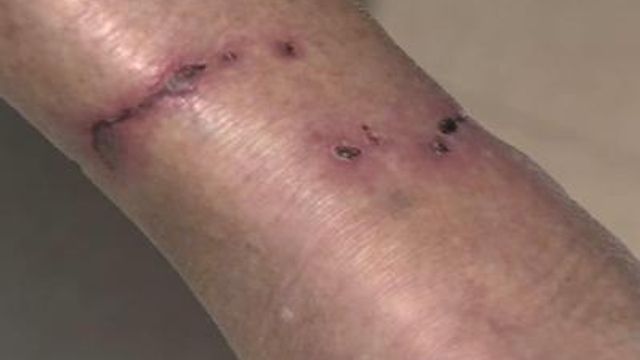Holly Springs woman recovering after fox attack
An 87-year-old woman credits her neighbors for saving her life when a rabid fox attacked her in the back yard of her Holly Springs home last week.
Posted — UpdatedDorothy Holland said Friday that she had been planting flowers when she saw what she thought was a small dog. By the time she realized the animal was a fox, it had attacked her.
For about 5 to 10 minutes, she fought the animal, trying to kick it off her, but every time she did, it went after the other leg.
"I thought I was going to die. I thought this was my last day," Holland said. "A lot of thoughts were going through my head. I didn't know what was going to happen, because I didn't know if anybody could hear me."
Neighbor Julie King and her nephew, Avery Younger, were on their back porch when they heard "life-and-death-sounding screams" – Holland's cries for help.
"They were the screams you hear in a horror film, only 10 times worse, because you know in your gut something's terribly wrong," King said.
Avery managed to scare the fox away and tracked it behind a storage building, where he shot it twice.
Holland suffered numerous wounds to her feet and has a serious infection in her left foot that has her hospitalized at WakeMed in Cary.
Family members said she has also undergone a series of shots to counteract the rabies virus.
"My fear would be that she wouldn't be here today, because that fox would have kept coming at her until she was dead," King said.
Since January, 29 foxes have tested positive for rabies statewide – five of which were in Wake County, according to the North Carolina Department of Health and Human Services.
Michael Williams, director of Wake County Animal Control, says the county usually averages about 15 rabies cases a year but that there's no way to know how many animals actually have the virus.
Reports are more common in the spring and summer months, he said, because people and animals are outside more.
Dr. Gay Benevides, an emergency room physician at WakeMed Cary, says the incident rate in wild animals, such as foxes, raccoons, bats and skunks, are much higher than domesticated animals.
"If a fox sees you and does not have rabies, they typically run from you," Benevides said. "If a fox is acting strange, acting aggressive toward you, then there is a much more likely chance that the animal is infected."
Prevention, as well as reporting and treating wounds from all animals, is critical, as rabies is lethal.
Animals with the virus usually die within 10 days, Benezides said. Death in humans is rare, with an average of two deaths per year.
Public health officials did issue a rabies alert on Monday for residents and visitors in the vicinity of Rouse Road and Piney Grove-Wilbon Road in Holly Springs.
"We don't want to alarm residents in the Holly Springs area, but they should be aware of this case and of the potential for exposure to themselves, family members and their pets," Williams said in a news release.
Anyone concerned about a rabid animal or who sees an animal acting in an unusual manner should contact Wake County Animal Control at 919-212-7387 or local animal control.
Public health officials have issued several rabies alerts in recent weeks after reports of rapid wildlife.
Last month, Wake County health officials issued one for Raleigh residents near the intersection of Bay Horse Lane and Mt. Vernon Church Road after a rabid fox was found in the area.
Cumberland County health officials also issued an alert for residents in Hope Mills' Gray Creek community after someone found a rabid raccoon.
And Wayne County Animal Control caught a fox in April that prompted them to issue a warning to residents in the Grantham area.
• Credits
Copyright 2024 by Capitol Broadcasting Company. All rights reserved. This material may not be published, broadcast, rewritten or redistributed.






